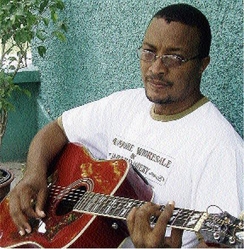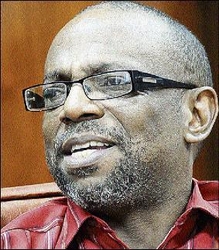

LEFT: Mikey Bennett
Rudolph Brown/Photographer
RIGHT: Clyde McKenzie, entertainment analyst, speaks at the Gleaner Editors' forum at the Gleaner.
Mel Cooke, Gleaner Writer
Thousands of Jamaicans dream of making it big in the music business, with most seeing themselves as the next dancehall star or award-winning singer.
But industry insiders say aspirants to microphone stardom should consider other avenues of making a living from the entertainment industry as the chances of making it big as a deejay are very slim.
"Indeed, it is easier to become a medical doctor than a top deejay. All you have to do is just look at the math. For, while the ratio of doctors to the general population is low, the proportion of top-flight deejays to the wider population is even smaller," entertainment analyst, Clyde McKenzie, told a Gleaner Editors' Forum on Tuesday.
However, in terms of job opportunities, he said the music industry "probably has a greater absorptive ability than any other area".
There are jobs available for chefs, lawyers, accountants, and many other areas not directly related to music, while recording and mixing engineers, lighting specialists, studio designers, stage providers and harmony singers are among the persons who have a more direct relationship with concerts and studio work.
That position is shared by Mikey Bennett of Grafton Studios in Vineyard Town, St Andrew.
He told The Sunday Gleaner that "the industry has scope for all these professions, or professional skill sets".
Limited budget
Bennett said that in a situation where there was a limited budget, as was often the case, "you find that a sole person has to take on many roles".
So while there are some persons who would have specific individuals for various tasks, many times it is an "all in one".
However, there are some highly specialised services that persons provide which may make all the difference in a performer's career, such as a physical coach to get the right body look, and a dance coach to work out the moves.
"A lawyer is one of the investments that many people do not make until it is too late," Bennett said.
Pointing to himself as an example, Bennett said he started out, not wanting to play multiple roles, wishing to be a writer only, but found himself having to multi-task.
"We need a new paradigm in music earnings. The music company of the future is a management agency or a booking agency," added Bennett.
Still, there are certain basic creative services which are required, such as an engineer, and Bennett points out that while in the trainee phase, there is a monthly salary involved, when the engineers have reached a point of independence it shifts to a freelance arrangement.
"Very few people are involved in a monthly salary thing," he said. "Most times it is done project by project. It is a few people, like (the late) Michael Jackson, who can actually pay monthly salaries."
However, there is still a high degree of consistency involved, as people do develop long-term relationships which exist parallel to other jobs, such as a musician who is part of a particular performer's touring band but will take on other jobs in between tours.
Bennett argued that one of Jamaica's weaknesses is that although there is obviously scope and need for particular skills, the education system does not facilitate students' development in the area.
He suggested that in some literature classes students could write song lyrics, which would then be analysed for things like metaphor, and worked on. Then an approach would be made to a producer.
"You think anybody going to turn down a good song?" he asked. "And then we have a nice cottage industry in the schools."